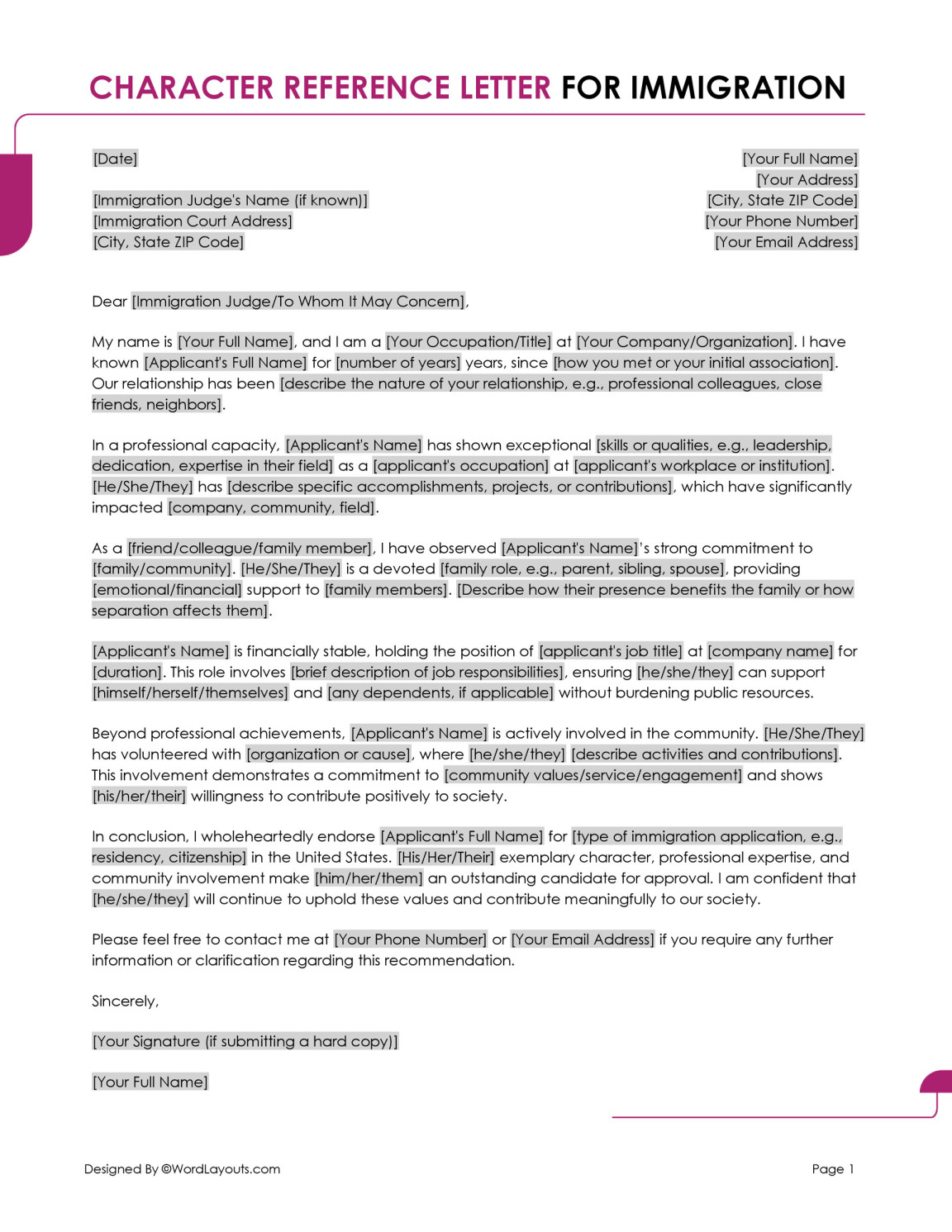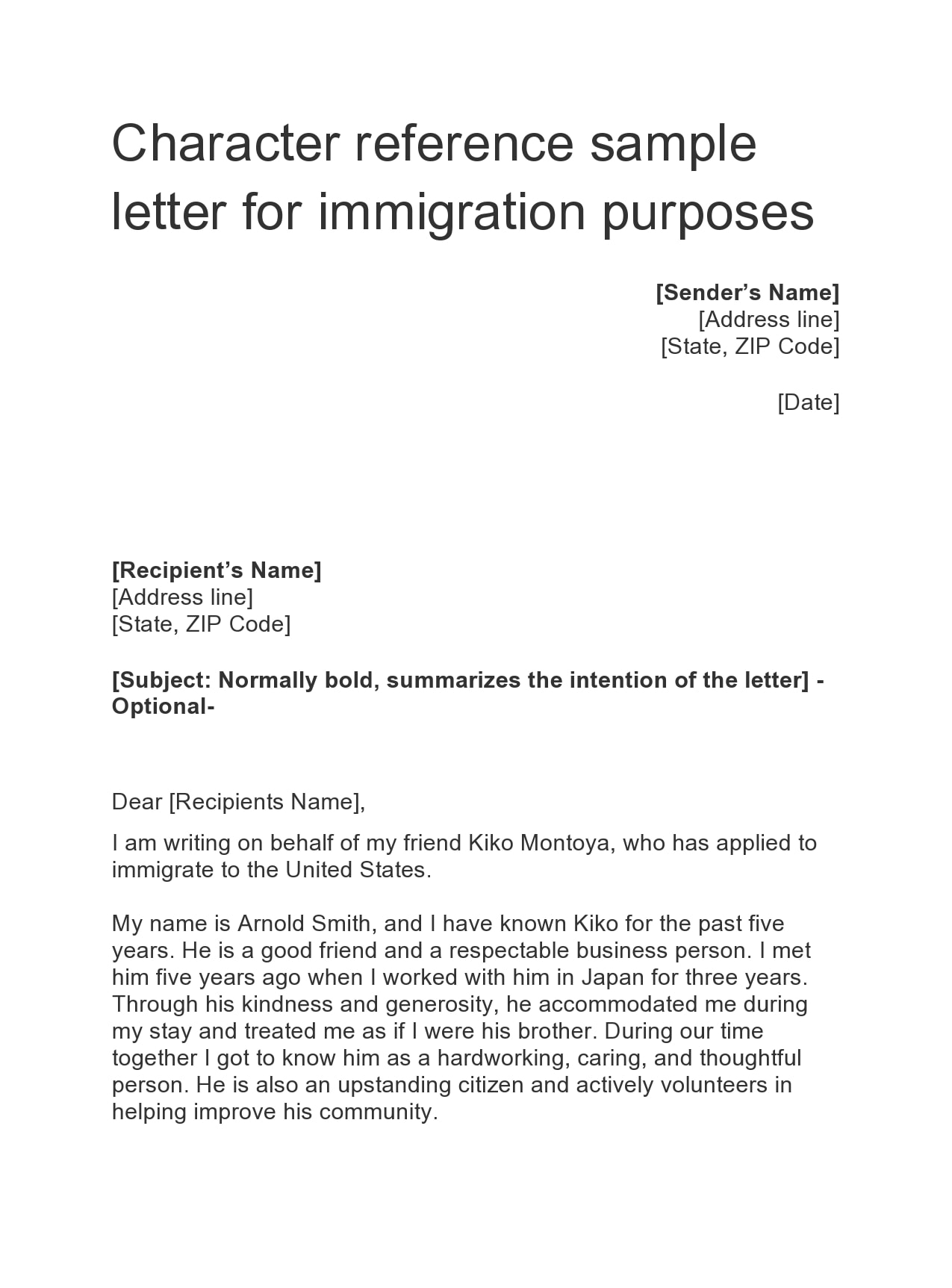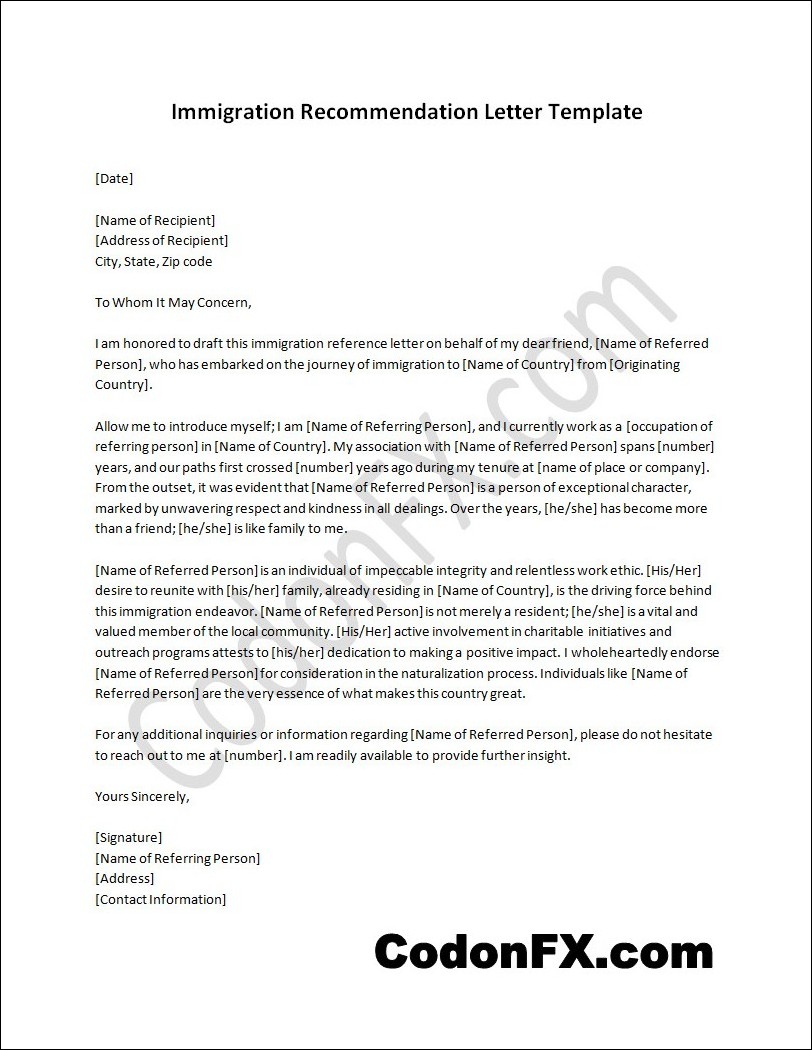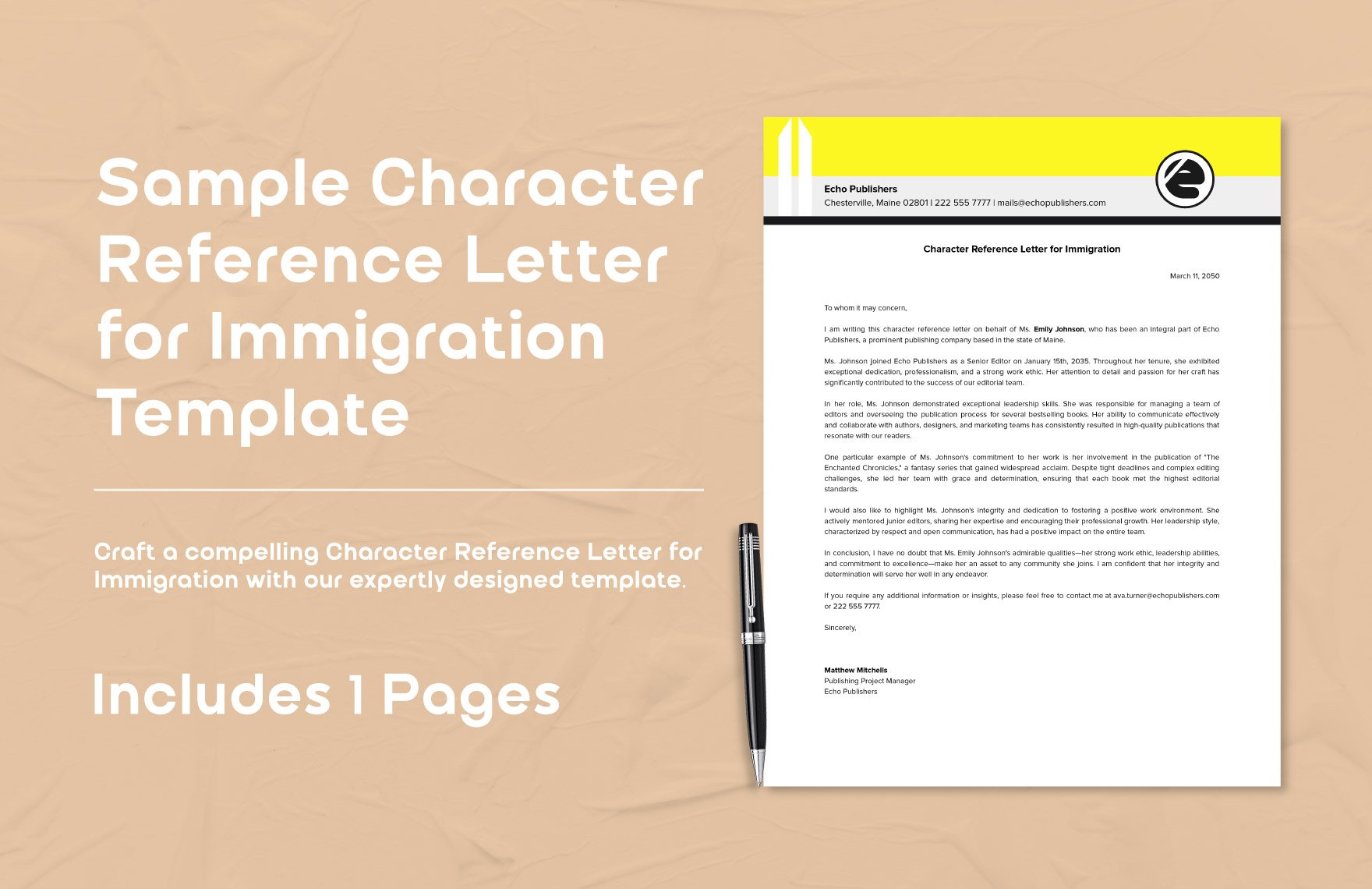The Character Reference Letter for Immigration Template That Works: A Comprehensive Guide
Navigating the immigration process can be daunting, and often, it requires more than just paperwork. Character reference letters are crucial pieces of evidence, offering personal testimonials that can sway an immigration officer’s decision. They paint a human picture, providing context and demonstrating the applicant’s good moral character, a key requirement for many visa and green card applications. But how do you craft a character reference letter that truly stands out? This guide provides a practical template and essential tips to help you write a compelling letter that effectively supports an immigration case.
Understanding the Importance of a Character Reference Letter
Before diving into the template, let’s understand why these letters are so vital. Immigration authorities often assess an applicant’s character, looking for evidence of law-abiding behavior, honesty, and good moral standing. A well-written character reference letter serves several purposes:
- Provides Context: It offers a personal perspective on the applicant’s life, demonstrating their positive contributions to their community.
- Verifies Information: It can corroborate statements made in the applicant’s application and other supporting documents.
- Demonstrates Relationships: It illustrates the nature and depth of the applicant’s relationships with people in their life, showcasing their social integration.
- Offers Emotional Support: While not the primary focus, a sincere letter can convey the applicant’s positive qualities and the impact they have on those around them.
The Character Reference Letter Template: A Step-by-Step Guide
This template provides a framework you can adapt to fit your specific relationship with the applicant and the particulars of their immigration case. Remember to personalize this template and provide specific examples to make your letter more impactful.
[Your Name] [Your Address] [Your Phone Number] [Your Email Address]
[Date]
United States Citizenship and Immigration Services (USCIS) / Relevant Immigration Office (If you know the address, include it here. If not, omit this line)
RE: Character Reference Letter for [Applicant’s Full Name], A-Number [Applicant’s A-Number, if known]
Dear Immigration Officer,
(1. Introduction: State Your Relationship and Overview)
- Begin by clearly stating your full name and your relationship to the applicant. Be specific (e.g., “I am [Your Name], and I am the applicant, [Applicant’s Name]’s, neighbor and friend for the past five years”).
- Briefly state the purpose of your letter: to vouch for the applicant’s good character and support their immigration application.
(2. Duration and Nature of the Relationship)
- Provide details about how long you have known the applicant and the nature of your relationship.
- Explain how you have interacted with the applicant (e.g., “We regularly meet for coffee,” “We work together at [Company Name],” “I have witnessed their dedication to their family and community”).
(3. Specific Examples of Positive Character Traits)
- This is the most crucial part. Provide specific examples that demonstrate the applicant’s positive character traits. Avoid generic statements. Instead, use anecdotes and observations. Consider highlighting traits such as:
- Honesty and Integrity: “I have always found [Applicant’s Name] to be a person of their word. I’ve witnessed them handle difficult situations with honesty and transparency, such as…”
- Respect for the Law: “I know [Applicant’s Name] to be a law-abiding citizen. I have never seen them engage in any activity that would suggest otherwise.”
- Kindness and Compassion: “I’ve seen [Applicant’s Name] volunteer at [Organization Name], helping [Specific activity or people].”
- Responsibility and Reliability: “I’ve witnessed [Applicant’s Name] handle their responsibilities, such as [specific example like paying bills, caring for family, or excelling at work] with dedication and reliability.”
- Community Involvement: " [Applicant’s name] is an active member of our community. They regularly [specific activities like volunteering, participating in local events, etc.]."
(4. Addressing Potential Concerns (If Applicable)
- If you are aware of any potential issues (e.g., a past traffic violation), you may choose to address them. However, do so with caution and only if you can offer a positive perspective. Briefly acknowledge the issue and explain how the applicant has learned from it or how it doesn’t reflect their overall character. (e.g., “While I am aware of a minor traffic violation from several years ago, I believe [Applicant’s Name] has learned from this experience and consistently demonstrates responsible behavior since.”) Always consult with an immigration attorney before addressing any potential concerns.
(5. Conclusion: Strong Statement of Support)
- Reiterate your strong support for the applicant’s immigration application.
- Express your belief in their good character and their potential to contribute positively to the community.
- Include a clear and concise statement, such as: “I wholeheartedly recommend [Applicant’s Name] for [visa type/green card] and believe they will be a valuable asset to the United States.”
(6. Your Signature and Contact Information)
- Sincerely,
- [Your Signature]
- [Your Typed Name]
- [Your Contact Information (Phone Number and Email Address)]
Key Tips for Writing a Powerful Character Reference Letter
- Be Honest and Authentic: Write from the heart. Authenticity is crucial.
- Be Specific: Provide concrete examples and anecdotes. Avoid vague generalizations.
- Be Positive: Focus on the applicant’s positive qualities.
- Proofread Carefully: Errors can undermine the credibility of your letter.
- Consider the Audience: Keep the immigration officer in mind. Use clear and concise language.
- Don’t Overpromise: Avoid making guarantees you can’t keep. Focus on the applicant’s character, not the outcome of their case.
- Consult with an Immigration Attorney: If possible, have an immigration attorney review your letter to ensure it aligns with the applicant’s legal strategy.
Common Mistakes to Avoid
- Using Generic Templates: Tailor the letter to the specific applicant and your relationship.
- Exaggerating or Lying: Honesty is paramount.
- Focusing on the Negative: Concentrate on the applicant’s positive attributes.
- Including Irrelevant Information: Stick to facts relevant to the applicant’s character.
- Not Providing Contact Information: Make it easy for the immigration officer to contact you if needed.
Frequently Asked Questions (FAQs)
1. Who should I ask to write a character reference letter?
You should ask people who know the applicant well and can attest to their good character. This could include friends, family members, neighbors, colleagues, teachers, religious leaders, or community members. Choose individuals with different perspectives to provide a well-rounded view.
2. How many character reference letters should I include?
There is no set number. However, it’s generally recommended to include at least two to three letters, especially if the application is complex. More letters from diverse sources can strengthen the application. Consult with an immigration attorney for guidance.
3. What if I don’t know the applicant very well?
If you don’t know the applicant very well, it’s best not to write a letter. Your letter needs to be based on personal knowledge and observations. If you can only provide limited information, it might be better to offer a brief statement instead of a full letter.
4. Can I write a character reference letter for a family member?
Yes, you can. However, be aware that the immigration officer may give more weight to letters from individuals who are not closely related to the applicant. Ensure you can provide specific examples of their good character.
5. Should I include copies of documents with my character reference letter?
It’s generally not necessary to include copies of documents unless they directly relate to the examples you are providing. For instance, if you mention the applicant’s volunteer work, you could include a copy of a certificate of appreciation. However, don’t overwhelm the immigration officer with unnecessary documentation.
Conclusion
Writing a compelling character reference letter is a significant step in supporting an immigration application. By using this template, providing specific examples, and following the tips outlined above, you can create a powerful testament to the applicant’s good moral character and help them on their path to a new life. Remember to tailor the letter to the individual and your relationship with them, and always prioritize honesty and authenticity. Good luck!




